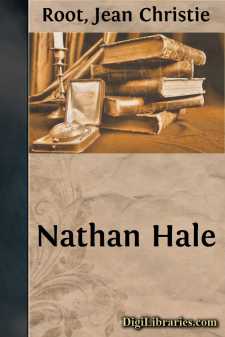Categories
- Antiques & Collectibles 13
- Architecture 36
- Art 48
- Bibles 22
- Biography & Autobiography 813
- Body, Mind & Spirit 142
- Business & Economics 28
- Children's Books 15
- Children's Fiction 12
- Computers 4
- Cooking 94
- Crafts & Hobbies 4
- Drama 346
- Education 46
- Family & Relationships 57
- Fiction 11828
- Games 19
- Gardening 17
- Health & Fitness 34
- History 1377
- House & Home 1
- Humor 147
- Juvenile Fiction 1873
- Juvenile Nonfiction 202
- Language Arts & Disciplines 88
- Law 16
- Literary Collections 686
- Literary Criticism 179
- Mathematics 13
- Medical 41
- Music 40
- Nature 179
- Non-Classifiable 1768
- Performing Arts 7
- Periodicals 1453
- Philosophy 64
- Photography 2
- Poetry 896
- Political Science 203
- Psychology 42
- Reference 154
- Religion 513
- Science 126
- Self-Help 84
- Social Science 81
- Sports & Recreation 34
- Study Aids 3
- Technology & Engineering 59
- Transportation 23
- Travel 463
- True Crime 29
Nathan Hale
Description:
Excerpt
CHAPTER I
Nathan Hale's Early Years
It is to-day a recognized fact that no life worthy of our reverence, or even a life calculated to awaken our fear, is the result of accident. Whatever may be the character, its basis has been the result of long-developing causes. This the life of Nathan Hale well illustrates. He was born at a time and under influences that were sure to develop the best qualities in him. He was an immediate descendant of the best of the Puritans on both sides of the sea. His great-grandfather, John Hale, was the son of Robert Hale, who came to America in 1632. John Hale graduated from Harvard in 1657 and was the first pastor settled in Beverly, Massachusetts, remaining there until he died, an aged man. An ardent patriot, this John Hale, in 1676, gave about one-twelfth of his salary, some seventy pounds, for defense in King Philip's War. When need arose in the French War, he went to Canada as a volunteer, for a threefold purpose,—so that he might accompany a number of his own parishioners, act as chaplain for one of the regiments, and fight when his aid was needed.
Living during the witchcraft trials, he was one of the first to be convinced of the mistaken course pursued. We are not certain as to his approval or disapproval of the progress of the excitement in regard to witchcraft until it became intensely personal to his own family. His wife was, fortunately as the results proved, accused by some misguided person of being a witch. The well-known nobility of her life, and her lovely character, at once convinced all who knew the circumstances that some terrible mistake had been made by her accuser. And if a mistake had been made in her case, why not in others? At once the deadly power of the delusion was broken and, happily, the tide turned back forever. There was no question after this of the Rev. Mr. Hale's viewpoint as to witchcraft.
In the very darkest depths of the witchcraft delusion, some illustrations of splendid courage and noble unselfishness were exhibited. Grewsome as it is, we cannot forbear quoting the example of one Giles Cory, condemned to die as a witch, who knew that if he did not confess he had bewitched people, his estate, which he wished his wife and family to inherit, would be forfeited, and that he would be pressed to death instead of being hanged.
Being hanged is a comparatively brief experience, while the other way is prolonged and agonizing. But, for the sake of his family, brave old Giles Cory calmly faced this terrible, lingering death. He must have won from some, if not from all, the feeling that a stout-hearted and generous man had proved his love for his own as no mere words could have done.
John Hale appears to have been a worthy ancestor of the youth Nathan Hale, who, a hundred years later, so freely made a sacrifice of his life.
John Hale's son, Samuel, was Nathan's grandfather; he made his home in Portsmouth, New Hampshire. One of Samuel Hale's sons, bearing his own name, Samuel, was a Harvard man. Another son, Richard, Nathan's father, born February 28, 1717, looking about to find the best farming lands for the support of a future family, moved to Connecticut, and became a farmer in South Coventry, thirty miles east of Hartford. Distinguished from the beginning for his success in whatever he undertook in business affairs, and also as a man of singularly upright character, Deacon Richard Hale won the warmest regard of all who knew him. His advice and help were sought, both in political and religious affairs, to the full limit of the time at his command.
His farm was among the best in that section. The house that he first occupied, probably one already on the place, was as comfortable and convenient as the usual homes of the earlier colonists. Later a larger house was built, big enough to accommodate a family of a dozen or more, and many guests as well. The house in which Nathan lived as a boy is still standing, and has fortunately come down to us with almost no mutilation....


